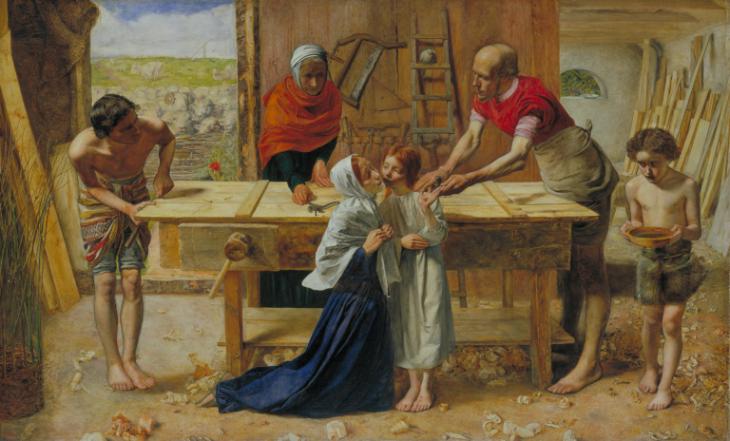
Advent 4 – Year A
Isaiah 7:10-16
Psalm 80
Romans 1:1-7
Matthew 1:18-25
I can’t believe that it is the Fourth Sunday of Advent! It has gone by way too quickly! I am reassured that there is still another week to go.
The Gospel readings for Fourth Sunday always revolve around Mary as she completes the picture of our Advent journey. It seems that at this time of the year, we Protestants are okay to talk about Mary and even have a statue of her in church without great resistance!
I was looking back over the lectionary to see which stories of Mary are used on this particular Sunday. Year B has set Luke 1 which is the Annunciation; when Mary was visited by Gabriel who brings her the good news that she will bear a son. Year C has also set Luke 1; the Magnificat in which Mary proclaims the greatness of the Lord who has looked with favour on her lowly self.
But every third year, the Gospel reading switches primary focus from Mary to Joseph with Matthew’s account and tells of the birth of Jesus. Matthew seems to focus his attention on Joseph much more than on Mary. You might not have noticed but Joseph never speaks.
We never hear his voice in any of the accounts. Mary speaks and there is great focus and attention on her. In comparison, we know very little about Joseph and there can be a temptation to push him to the side-lines. I want to take the opportunity to look a little closer at Joseph. Without him the whole Christmas story would have faltered.
Recently in the Tuesday afternoon Bible Study, we watched a version of the nativity story over 3 weeks. While it took some liberties with the dialogue as having been written by a writer from EastEnders, it was thoroughly enjoyed. Joseph was portrayed as a responsible but passionate younger man who was deeply in love with Mary. When Mary returns from visiting her cousin Elizabeth with a very obvious baby bump, Joseph is devastated, angry, grief-stricken, embarrassed. As viewers, we were confronted with a range of emotions and conversations between Mary and Joseph that were likely experienced but are not mentioned in the biblical story.
In Matthew’s account, Joseph is told about Mary’s baby and in a breath decides to quietly divorce her and save her from public disgrace. Here we see the loyalty and dignity, faithfulness of Joseph.
It is not until the angel appears to Joseph in a dream to explain the whole situation that he believes Mary’s story when he wakes up.
We would make a mistake to sanitise Joseph’s consent as being an easy decision to come to. We diminish his humanity by overlooking his humiliation and doubt. In a culture and religion that was bound by rules, Joseph would have been in a lot of pain. We so often want to separate ourselves from the pain of other people, we can feel so helpless in the face of it. In Joseph, we see that God’s favour is not always a shiny, happy thing.
Whatever thoughts Joseph had about his family’s future were upended. His ideas of fairness, justice, goodness and purity are shattered. Being chosen by God is not always so attractive.
Joseph’s story is one that can give us hope. Many of us will know what it is to struggle to do what has been asked of us, sometimes the decisions are difficult and the choices are limited. Joseph struggled. He was prepared to do the honourable, arguably easier thing but that was not what was asked.
So he struggled more and came to the decision that was far harder but the right one. He woke up and did what the angel commanded him.
Little wonder that the angel’s opening line was do not be afraid. Joseph was needed as it is through him that Jesus’ connection to the House of David is made. If you read through the opening verses of Matthew chapter one, it is a cabaret of characters who did some interesting things.
Debie Thomas wrote, ‘Interestingly, in the verses that immediately precede our Gospel reading, Matthew gives us a genealogy of Jesus’s ancestors. He mentions Abraham — the patriarch who abandoned his son, Ishmael, and twice endangered his wife’s safety in order to save his own skin. He mentions Jacob, the trickster usurper who humiliated his older brother. He mentions David, who slept with another man’s wife and then ordered that man’s murder to protect his own reputation. He mentions Tamar, who pretended to be a sex worker, and Rahab, who was one. These are just a few representative samples.
Notice anything? Anything like messiness? Complication? Scandal? Sin? How interesting that God, who could have chosen any genealogy for his Son, chose a long line of brokenness, imperfection, dishonour, and scandal. The perfect backdrop, I suppose, for his beautiful works of restoration, healing, hope, and second chances.’
Not only was Jesus born into a messy world, but a messy family.
Joseph helps to remind us that what God asks of us is often messy and unexpected. We should however expect to have our own ideas upended and challenged. Yet do not be afraid. I hope as we come fully into this Christmas season and new year that we are not afraid to love more deeply, pay more attention to what God is doing or asking of us. It might be messy.
Do not be afraid of the mess. It is in the mess that Jesus our Saviour was born.